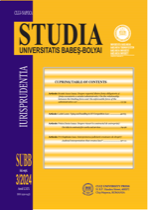Résumé
Riscul, din perspectivă juridică, reprezintă un element obiectiv, independent de voința părților, ce reflectă incertitudine și imprevizibilitate. Totodată, acesta este un eveniment capabil să afecteze echilibrul contractual și să genereze consecințe nefavorabile pentru ambele părți. Prin urmare, lucrarea dorește să exploreze modalitatea de gestionare riscurilor în contractul de antrepriză, punând accent pe importanța menținerii unui echilibru just între părți și pe modul în care aceste riscuri pot fi ajustate atunci când se ivesc pe parcursul contractului. Antreprenorul, în calitate de profesionist, își asumă aducerea la îndeplinire a obligațiilor contractuale în mod independent, pe propriul risc, având totodată o libertate de organizare și o responsabilitate privind finalitatea contractului. Studiul urmărește clarificarea influenței riscurilor asupra drepturilor și obligațiilor, pornind de la reglementările actuale la care se adaugă interpretări suplimentare privind transferul riscurilor, relevanța naturii obligațiilor și rolul garanțiilor. Analiza se concentrează pe identificarea riscurilor asociate contractului de antrepriză, precum și pe modul în care acestea sunt asumate de antreprenor înainte și după momentul recepției. Totodată, este urmărită clarificarea modului în care se transferă riscurile între părți, în funcție de momentul contractual și de prevederile contractuale și se examinează impactul garanțiilor, tipologiei obligațiilor și a modalității de stabilire a prețului asupra repartizării riscurilor. Concluziile pun în lumină necesitatea unor mecanisme clare și flexibile pentru repartizarea riscurilor, contribuind la reducerea dezechilibrelor și la asigurarea unei relații contractuale echitabile și previzibile.

